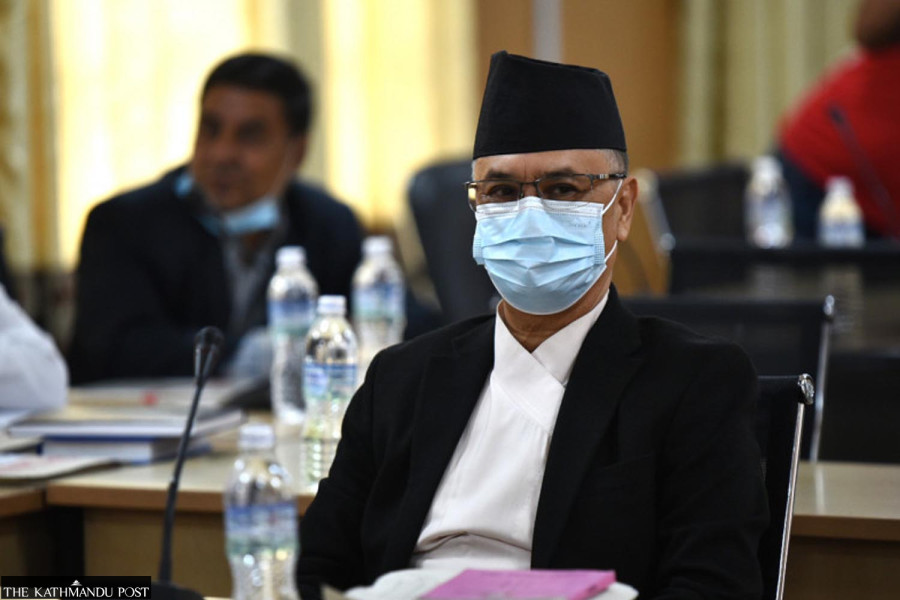National
What happens to motion against chief justice after lower house term ends?
Suspended due to the impeachment motion, Chief Justice Rana might seek court order to return to work, experts say
Binod Ghimire
Following the Election Commission's conclusion that the House of Representatives cannot function after the nominations for Proportional Representation seats are filed at the commission, the lower house has hardly a week before it expires.
As per the schedule for the November 20 polls, the listing of the nominees under the proportional representation system should be done on September 17 and 18. The lower house, therefore, cannot function beyond September 17. Its term is expiring even as there are several crucial bills and motions that are to be endorsed, including the impeachment motion against suspended Chief Justice Cholendra Shumsher Rana.
The Impeachment Recommendation Committee formed to probe the allegations against Rana is yet to get full clarification from him. Rana has so far answered only 11 of the 43 questions prepared by the committee. The next meeting called for Sunday will put additional questions before Rana. The tedious three question-answer sessions so far suggest it will take at least a couple of days to complete the clarification process.
“We are yet to hold discussions with the Nepal Bar Association and the Supreme Court Bar Association, among other stakeholders,” Ram Bahadur Bista, coordinator of the recommendation committee, told the Post. “I don’t see how we will be able to prepare the final probe report and present it to the full house on time.”
As many as 98 lawmakers from the Nepali Congress, the Communist Party of Nepal (Maoist Centre) and the CPN (Unified Socialist) had filed the impeachment motion against Rana, leveling 21 charges against him. Promoting corruption in the judiciary, interfering in the appointment of the justices and judges, bargaining for a share in the government, passing controversial decisions in several cases and failing to perform his constitutional duties are some allegations the ruling parties have levelled against him. The recommendation committee is tasked with investigating them and preparing a final report on whether Rana should be impeached.
However, it is not in a position to complete its job before the term of the lower house expires, raising a question over the fate of the impeachment motion. “There is no legal or constitutional clarity on whether the motion gets transferred to the House that is to be elected by the November 20 elections,” said Bista. “Rana can continue on his job if the motion, like other bills, becomes null and void after the term of the lower house ends but he will remain suspended if it gets transferred to the to-be-elected House.”
Article 111 (10) of the Constitution of Nepal says the bill that is registered in the House of Representatives will become ineffective if the House is dissolved or its term comes to an end while the bill is still being considered in Parliament. However, the constitution is silent on the status of the impeachment motion.
“While there are confusions, the ruling parties believe the motion will get continuation in the post-November 20 House,” Min Bishwakarma, a whip of the Nepali Congress, who also is a member of the recommendation committee, told the Post. “Let’s see how the situation unfolds.”
Legal experts are divided on the matter.
Advocate Raju Prasad Chapagain, former chairperson of the Constitutional Lawyers’ Forum, said the nature of the impeachment motion is different to that of other bills so it gets continuation in the next House of Representatives. “The impeachment motion is a list of accusations against Rana which the parliament needs to decide on,” he told the Post. “Rana cannot return to his office without coming clean.”
Acting Chief Justice Deepak Kumar Karki has been leading the judiciary after the suspension of Rana following the lodging of the impeachment motion against him. Karki retires on October 1 while Rana retires due to age-limit only on December 12. Ganesh Datta Bhatta, a former associate professor at the Nepal Law Campus, argues that the impeachment motion will be rendered null and void with the expiry of the tenure of the incumbent House.
“How can the impeachment motion remain alive when the House and lawmakers who initiated the impeachment motion no longer exist?” he told the Post. “If the House cannot prove the allegations against Rana, there are no hurdles for him to return to work.”
The officials at the Parliament Secretariat also say that the impeachment motion will not pass on to the House to be elected by the upcoming polls. “As far as I understand, the impeachment motion will become ineffective as soon as the term of the incumbent parliament ends,” said a joint secretary at the secretariat. He, however, sees complications for Rana in rejoining his job.
“Rana was suspended following a letter from Parliament. There must be some decisions to make that letter ineffective,” said the official. “I think Rana can move the Supreme Court seeking its intervention to allow him to work. All depends on the court’s verdict.”




 13.12°C Kathmandu
13.12°C Kathmandu














